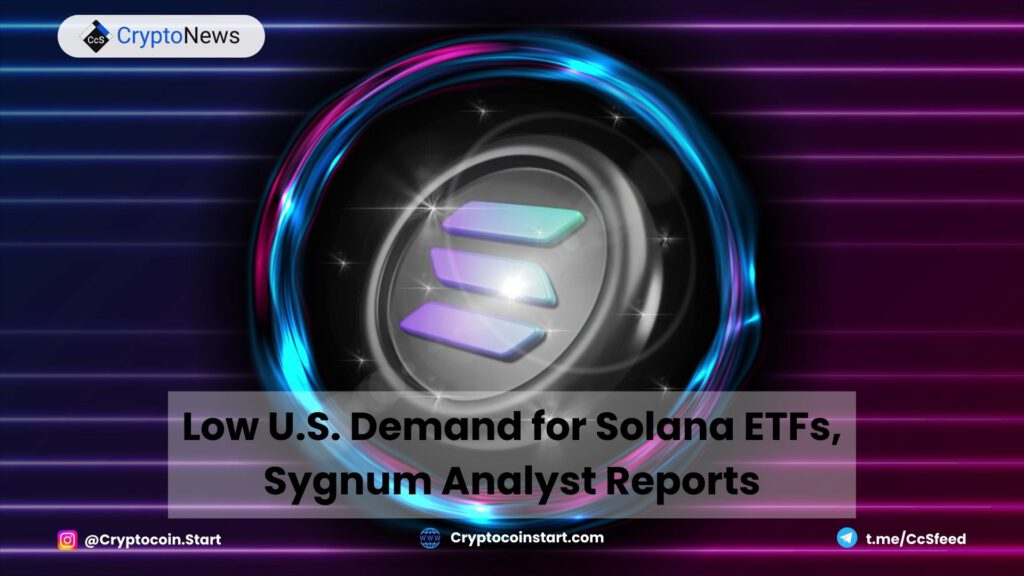
Introduction
The launch of Solana exchange-traded funds (ETFs) in the United States has generated considerable debate among investors and analysts regarding their potential demand. Katalin Tischhauser, head of investment research at Sygnum, a leading crypto bank, has voiced skepticism about the level of interest these ETFs will attract from U.S. investors.
Skepticism Over Solana ETFs
Tischhauser’s doubts stem from the performance of the Grayscale Solana Trust (GSOL), a private fund managed by Grayscale Investments. Despite the popularity of ETFs for cryptocurrencies like Bitcoin and Ethereum, the GSOL has experienced only “minuscule” inflows. Tischhauser suggests that this indicates weak demand for Solana-based investment products among U.S. wealth managers.
As of August 2024, the GSOL’s assets under management (AUM) were below $70 million, a stark contrast to the Grayscale Bitcoin Trust, which managed nearly $30 billion before converting to an ETF earlier this year. Tischhauser attributes this disparity to the “relative name recognition of Solana versus Bitcoin,” noting that Bitcoin’s established reputation and widespread adoption make it a more attractive investment.
Premium Trading and Market Impact
Interestingly, GSOL shares are trading at a premium to their net asset value (NAV), with a markup exceeding 7x as of mid-August. While this high premium suggests some demand, Tischhauser argues that it does not signify the kind of widespread interest that would significantly impact the market. “The high premium suggests some demand, but it’s not the kind of demand that will significantly impact the market,” she remarked.
Comparison with Bitcoin and Ethereum ETFs
The lukewarm reception of Solana ETFs contrasts sharply with the success of Bitcoin and Ethereum ETFs. According to data from Morningstar, Bitcoin and Ether ETFs have collectively amassed nearly $63 billion in AUM in 2024, reflecting strong institutional and retail interest in these leading cryptocurrencies.
Dave LaValle, Grayscale’s global head of ETFs, noted the unprecedented demand for Bitcoin ETFs, stating, “Since launching in January, BTC ETFs have seen more than three times the largest one-year inflow of any ETF ever in the history of ETFs. So, we’re talking about massive, massive adoption.” This surge has spurred speculation about which cryptocurrencies might follow suit with ETF launches.
Potential Solana ETF Players
Despite the current tepid demand, several asset managers are exploring Solana ETFs. Franklin Templeton, VanEck, and 21Shares have shown interest in this market. However, BlackRock, the largest ETF manager by AUM, has decided against pursuing a Solana ETF due to “very little interest” from its clients.
Tischhauser suggests that while smaller issuers might find launching Solana ETFs financially viable, these products are unlikely to make a significant impact on the broader crypto market. “Smaller issuers may make more money than their expenses by launching and running these products,” she explained. “But it’s not going to be significant for the crypto market—it’s not going to be exciting.”
Future Outlook
Solana ETFs appear to be a niche market with limited appeal compared to the overwhelming demand for Bitcoin and Ethereum ETFs. While there is some interest in Solana, it has yet to achieve the recognition and adoption needed to drive substantial demand for related financial products. Consequently, Solana ETFs are expected to remain a specialized option rather than a major market force.
Bybit Expands Solana-Based Assets
In related news, Bybit, a leading cryptocurrency exchange, has expanded its support for Solana-based assets. On August 15, Bybit announced the addition of PayPal’s PYUSD stablecoin to its platform, marking a significant development in the integration of decentralized finance (DeFi) assets into mainstream financial ecosystems.
Growth of PYUSD
The inclusion of PYUSD on Bybit underscores the growing adoption of PayPal’s stablecoin. PYUSD recently surpassed 500,000 processed transactions, highlighting its increasing utility. According to DeFi analytics platform DefiLlama, over 54% of PYUSD’s market liquidity is on the Solana blockchain, with the remainder on Ethereum (ETH).
PYUSD’s rapid ascent in the stablecoin market is evidenced by its ranking as the sixth-largest stablecoin by market capitalization and a 30.7% month-on-month growth, according to DefiLlama. This growth reflects strong market demand and integration into various blockchain ecosystems.
Strategic Choice of Solana
Emily Bao, head of web3 and strategic business units at Bybit, emphasized the significance of PYUSD’s performance on Solana. “The stablecoin’s performance on Solana has demonstrated the market’s demand for a regulated, secure stablecoin that can keep pace with the rapid developments in decentralized finance,” Bao stated.
Bybit’s decision to support Solana aligns with its vision of advancing DeFi innovation. Solana’s scalability and efficiency make it an attractive environment for stablecoins like PYUSD, catering to the demand for faster and more affordable transactions.
PayPal’s PYUSD, launched in August 2023, represents a significant step in integrating blockchain technology into traditional finance. Backed by U.S. dollar deposits and other cash equivalents, PYUSD offers a stable and secure asset for various financial applications. Despite regulatory scrutiny, PayPal’s partnership with Paxos to issue PYUSD reflects a commitment to meeting stringent regulatory standards while innovating in the digital asset space.

